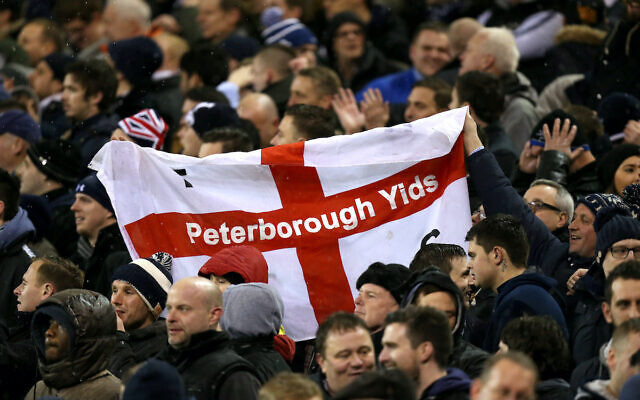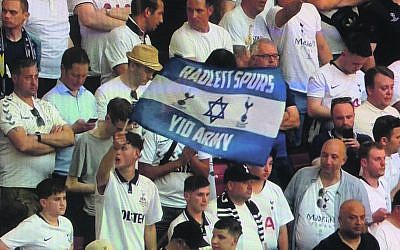Spurs fans refuse to drop the ‘Y-word’ at first home game of season
An expert in antisemitism at European football, who attended Spurs first home fixture of new season, tells Jewish News he believes the club require ' a different, broader approach' to educating fans who continue using the Y-word
Lee Harpin is the Jewish News's political editor

It didn’t take long to hear the first strains of “Yid Army” as Spurs fans joined the upward escalator at Seven Sisters tube station on their way to last weekend’s first game of the season.
A small group of men, perhaps in their mid-40s, led the chant, but they were quickly joined by several younger boys, one who looked no older than 12 years-old, as the escalator neared the ticket barriers at the top of the crowded station.
There was just enough time for another “Yid Army”, in front of the watching Metropolitan Police officers, before the excited fans, eager to see Antonio Conte’s team gain three points against Southampton, began the 20 minute long stroll down the Seven Sisters Road to reach their team’s majestic 63,000 capacity Tottenham Hotspur Stadium.
A Jewish Spurs fan for nearly five decades now, the Y-word debate at the club had often played on my mind.

At certain times, I’d agreed with those who argued the word was being reclaimed from the National Front and British Movement fascists I’d seen outside grounds such as West Ham’s and Chelsea in my youth, selling newspapers that urged the white population of the UK to “get rid of the Blacks and the Yids.”
But more recently, the use of the Y-word by Spurs fans had, to my mind, become increasingly problematic.
Most of those using the chant were not themselves Jewish, so how could they be reclaiming the word?
And some, but not all, of the Jewish fans who argued in favour of using the Y-word, well, they were also the same fans who were not adverse to using racist slurs of a different nature against rival fans.
Hardly a progressive advert for continuing with Y-word chants.
And yet despite all of the negative connotations of the Y-word, I still could not bring myself to truly hate most of those Spurs fans using the chant.
Not in the same way I would despise someone who used racial slurs against another ethnic minority.
There was still a tiny part of me that held on to the notion that it was OK for Spurs fans to reclaim the word.
And, perhaps, as a result of in-grained tribal football identity, there was also a part of me that still gets mildly irritated when fans of other clubs – Chelsea fans such as David and Ivor Baddiel, for instance – lecture Spurs fans about why it is time to stop using the Y-word.

Walking down Seven Sisters Road with me last weekend was Pavel Brunssen, a German born PhD student at the University of Michigan, who had himself earned an MA from the Centre for Research on Antisemitism at the Technische Universität in Berlin.
Brunssen, who has also studied modern Hebrew, and Yiddish at universities in Israel, is a true expert in researching antisemitism within European football, and also the author a book, Antisemitismus in Fußball-Fankulturen: Der Fall RB Leipzig, which looked into hatred and possible antisemitism against the German soccer club RB Leipzig.
His initial observations on the conduct of fans at the Spurs v Southampton game, are pretty spot on, in my mind.
The Y-word chants are both “highly problematic and highly contested”, he said.
But at the same time “you can also tell they are part of the fan culture, of the club culture, of the history of the fans who have reclaimed the word. ”
Brunssen, who has come to London to write a chapter on for his latest academic work on fan culture and antisemitism, says he has previously heard chants such as the vile ‘Spurs are on their way to Auschwitz’, sung in the past by fans of some of the club’s most bitter rivals.
The Y-word chants sung by Spurs fans now are “of course problematic”, says Brunssen, but they are not sung with the same hatred and antisemitic intent as those who make historical reference to Nazis and gas chambers.
During his 10 day stay in London, he is attempting to speak with supporters groups, and if possible Spurs themselves, to gain further insight into the debate around fans’ use of the Y-word.
Earlier this year, Spurs had issued a statement on their website telling fans the club now believed it was “time to move on” from using the Y-word, following consultation with fans at focus groups over the pandemic.
“Speaking to Spurs fans I get the feeling that some are saying ‘why are we the target of this campaign when there are other clubs out there whose fans are making gas noises at games?'” says Brunssen.
“I think a different, broader approach is required.
“My sense is Tottenham fans are happy to be part of the debate, and they want to be vocal on it.
“But they want to see fans of other clubs being educated on the debate.”

It had been my original intention to attempt to count just how many times the Y-word was chanted, or sung during the 90 minutes of the game against Southampton, which resulted in a convincing 4-1 win for the home side, with fans, apart from the first 10 minutes, in upbeat mood throughout.
From as early as seven minutes into the game came the chants of “Yid Army”, by nine minutes the one-worded “Yids!” was overheard, and a few minutes later came the first rendition of “Being a Yid, being a Yid, the thing I like most is being a Yid.”
Then as Spurs scored their first goal large sections of the ground erupted into “Yidio! Yidio, Yidio” with fans on their feet engaging in a celebratory dance.
Sporadic “Yids” chants continued throughout the first half from fans dotted around the ground.
So frequent was the word’s use, I decided to abandon any attempt to count how many times it was uttered.
After the match, myself and Brunssen stopped at the unofficial souvenir stalls dotted down the high road in N17 north London.
Alongside the scarfs bearing the names of Harry Kane, Son, and more confusingly new Swedish-born star Kulusevski, were a series of tiny badges.
For just £3 you can purchase badges reading “London YIDS finest.”
Another badge read “London’s finest Yid Army” while a blue and white Star of David badge was imprinted with the N17 Tottenham post code.

Speaking with one of the stall owners, he said he had done “brisk business” on the day which was particularly pleasing, he said,because a game against Southampton is far from the most glamorous home game of the season.
Next weekend, in one of the most glamorous and bitterly contested fixtures of the season, Spurs travel across London to play Chelsea at Stamford Bridge.
To their credit, Chelsea have, under former owner Roman Abramovich, launched high-profile campaigns around Holocaust education that have stopped the majority of their fanbase from continuing to use antisemitic chants about Spurs.
Chelsea’s new owners, who include Jonathan Goldstein, the former Jewish Leadership Council chair, have vowed to continue with the work combating antisemitism and racism.
In all likelihood, at Sunday’s fixture it will be the Spurs fans who continue to use the Y-word in songs and chants throughout the game.
Alongside my German friend, I’m hopeful of being in the ground to observe.

Thank you for helping to make Jewish News the leading source of news and opinion for the UK Jewish community. Today we're asking for your invaluable help to continue putting our community first in everything we do.
For as little as £5 a month you can help sustain the vital work we do in celebrating and standing up for Jewish life in Britain.
Jewish News holds our community together and keeps us connected. Like a synagogue, it’s where people turn to feel part of something bigger. It also proudly shows the rest of Britain the vibrancy and rich culture of modern Jewish life.
You can make a quick and easy one-off or monthly contribution of £5, £10, £20 or any other sum you’re comfortable with.
100% of your donation will help us continue celebrating our community, in all its dynamic diversity...
Engaging
Being a community platform means so much more than producing a newspaper and website. One of our proudest roles is media partnering with our invaluable charities to amplify the outstanding work they do to help us all.
Celebrating
There’s no shortage of oys in the world but Jewish News takes every opportunity to celebrate the joys too, through projects like Night of Heroes, 40 Under 40 and other compelling countdowns that make the community kvell with pride.
Pioneering
In the first collaboration between media outlets from different faiths, Jewish News worked with British Muslim TV and Church Times to produce a list of young activists leading the way on interfaith understanding.
Campaigning
Royal Mail issued a stamp honouring Holocaust hero Sir Nicholas Winton after a Jewish News campaign attracted more than 100,000 backers. Jewish Newsalso produces special editions of the paper highlighting pressing issues including mental health and Holocaust remembrance.
Easy access
In an age when news is readily accessible, Jewish News provides high-quality content free online and offline, removing any financial barriers to connecting people.
Voice of our community to wider society
The Jewish News team regularly appears on TV, radio and on the pages of the national press to comment on stories about the Jewish community. Easy access to the paper on the streets of London also means Jewish News provides an invaluable window into the community for the country at large.
We hope you agree all this is worth preserving.





















